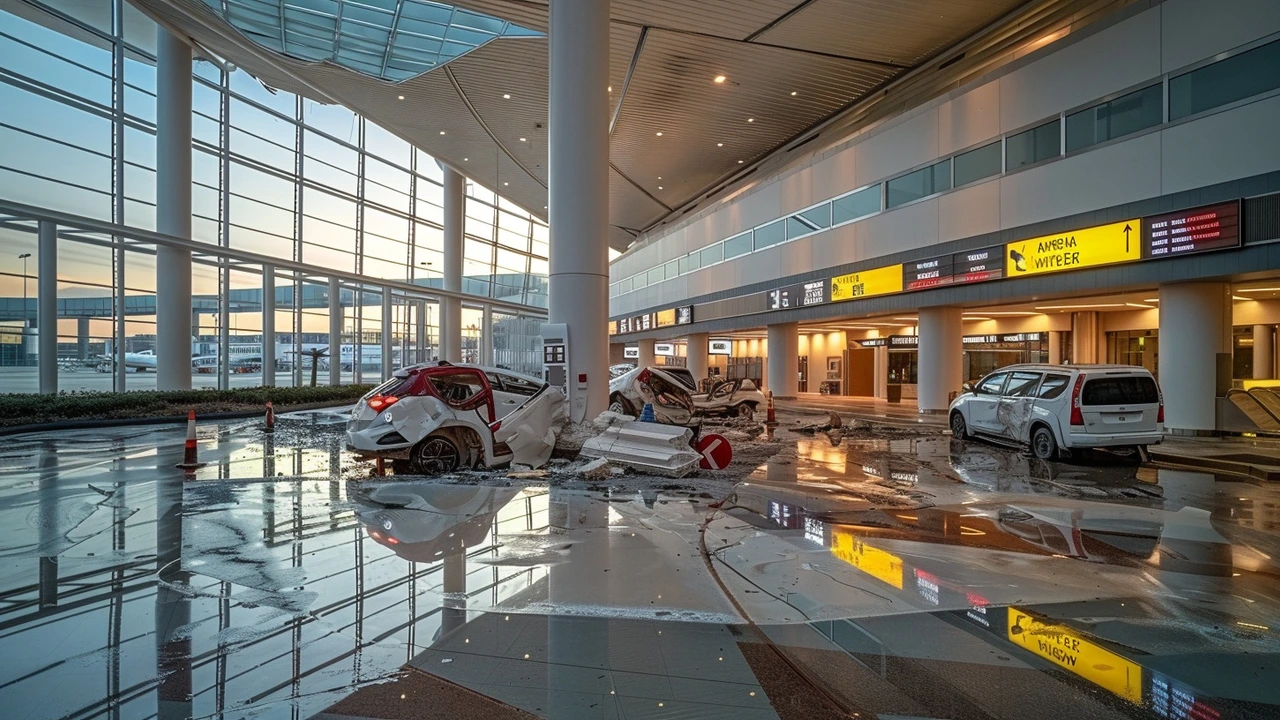
A Tragic Incident Amid Heavy Rains
The serene travel plans of numerous passengers were violently disrupted on Friday, June 28, as a part of the roof at Terminal 1 of Delhi Airport collapsed precipitously. The catastrophic incident resulted in a tragic fatality and caused injuries to at least six others, creating a sorrow-filled chaos at one of the busiest airports in India. The roof collapse has been attributed to an unusual bout of heavy rainfall that battered the capital city, registering a staggering 148.5 mm within a mere span of three hours. This exceeded the monthly average for June, posing an unexpected challenge to the airport's infrastructure.
Immediate Flight Cancellations and Rescheduling
The collapse had an immediate ripple effect on the airport's operations, particularly those centered on Terminal 1. This terminal, usually bustling with activity as it facilitates around 190-200 flights daily, saw a massive shutdown of operations. Significant cancellations came from Indigo, which alone cancelled over 80 of its scheduled flights. SpiceJet followed closely, cancelling around 15 flights, while other airlines also adjusted their schedules to adapt to the sudden crisis.
Passengers affected by these cancellations needed swift redirection and rebooking of their flights. Consequently, domestic flights originally set to fly from Terminal 1 were reassigned to Terminals 2 and 3, creating a logistical maze not only for airline staff but for the passengers who found themselves in a whirlwind of urgency and confusion.
Government Intervention to Prevent Fare Hikes
In the wake of the structural calamity and ensuing flight disruptions, the Ministry of Civil Aviation took noteworthy precautious measures. They swiftly issued notices to various airlines operating out of Delhi, including major carriers like Indigo, SpiceJet, and Air India, among others. The Ministry's primary concern was to guard against potential fare hikes, which could further distress passengers already grappling with cancelled or rescheduled travel plans. Airlines have been advised to vigilantly monitor ticket prices, ensuring that there's no undue surge that would exploit the precarious scenario. This measure seeks to provide a semblance of stability and assurance to passengers already facing inconvenience.

Operational Capacity and Infrastructure Concerns
Delhi Airport, distinguished for its high operational volume, handles an impressive capacity of around 40 million passengers annually. Terminal 1 is a vital cog in this colossal travel machine, contributing significantly to this capacity by managing an average of around 200 arrivals and departures daily. The recent roof collapse not only signifies an operational setback but also places a spotlight on the integrity of the airport's infrastructure. Heavy rains, while common during the monsoon season, clearly revealed vulnerabilities that demand urgent attention and rectification to prevent future incidents.
Adjusting to New Realities
In the wake of this incident, Delhi Airport’s management is under pressure to ensure safety and regain passenger confidence. This includes thorough investigations to ascertain the exact reasons behind the structural failure and implementing stringent measures to bolster the terminal's resilience against similar future episodes. Concurrently, airlines are tasked with the challenge of managing the logistical hurdles posed by the sudden need to reroute flights and manage increased operations at Terminals 2 and 3.
) Inclement weather, a perennial challenge in aviation, necessitates robust infrastructural defenses and rigorous maintenance protocols to withstand extreme conditions. The recent event at Delhi Airport starkly underlines the need for continuous vigilance, ongoing infrastructure assessments, and the readiness to adapt swiftly to emergent challenges.
Ministry’s Directive on Penal Charges
The Ministry of Civil Aviation also offered a measure of comfort to the passengers with their directive regarding penal charges. They provided clear instructions that any cancellations or rescheduling of flights directly resulting from the roof collapse incident should not incur penal charges. This directive aims to ease passenger woes, allowing rescheduling without the additional burden of hefty penalties, and underscores the Ministry's commitment to safeguarding passenger rights amid unforeseen disruptions.

A Community Impact
The ramifications of the roof collapse transcend mere operational disruptions; they affect the broader travel community, including passengers, airport staff, and airline employees. For the passengers, it meant sudden changes in travel plans, dealing with uncertainty and potential scheduling conflicts. For the staff and airline crew, it was about managing the crisis efficiently while ensuring safety and minimal inconvenience.
The tragic occurrence left an indelible mark on all involved, serving as a stark reminder of the fragile balance in aviation operations that can be upended by unforeseen calamities. The collective effort to stabilize and restore normalcy post the incident highlights a unified resolve to ensure safety, efficiency, and care for all stakeholders involved.
Looking Ahead
As investigations continue and restoration efforts gain momentum, the priority remains on establishing enhanced safety protocols and ensuring that such a harrowing event does not repeat. The aviation community remains resilient, learning from each incident to fortify its commitment to passenger safety and infrastructural integrity.
Meanwhile, passengers are encouraged to stay informed about their travel schedules, stay in touch with their respective airlines, and remain patient as the authorities and airlines work towards normalcy. The incident at Delhi Airport Terminal 1 is a profound reminder of the unpredictable nature of travel and the intrinsic necessity for safety protocols and infrastructural integrity in safeguarding human lives and ensuring seamless travel experiences.
13 Comments
Write a comment
More Articles

ICPC Probe Reveals Missing ₦71.2 Billion in Nigeria Student Loan Disbursements
The ICPC is investigating missing funds from the Nigeria Education Loan Fund, with only ₦28.8 billion out of ₦100 billion reaching students. Over 50 tertiary institutions face scrutiny for unauthorized deductions, while protests and deeper probes into top government agencies intensify.

Manchester City Targets Nico Gonzalez: Potential Financial Gains for Barcelona
Manchester City, led by Pep Guardiola, is reportedly interested in acquiring Porto's Nico Gonzalez in a potential transfer that could benefit Barcelona financially. The Spanish club included a 40% sell-on clause in Gonzalez's deal when he moved from Barcelona to Porto. If his release clause of €60 million is met, Barcelona could earn €24 million, enhancing their financial standing amid ongoing negotiations.

Chandrajyoti Singh
June 30, 2024 AT 00:26It is reassuring to see the Ministry stepping in promptly to prevent any opportunistic fare hikes following the roof collapse at Terminal 1. By issuing clear directives, the authorities aim to protect passengers from additional financial strain amid the chaos. This approach also signals a commitment to maintaining trust in the civil aviation sector. Continuous monitoring will be essential to ensure that airlines adhere to these guidelines.